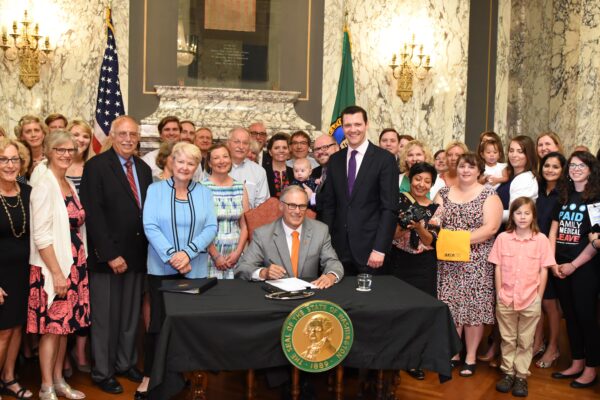Our Successes
The Economic Opportunity Institute has been at the forefront of numerous progressive policy victories that have improved the lives of people across Washington state. We believe progress is possible when we stand together, stay rooted in our values, and refuse to accept that injustice is inevitable.
Our work, centered on fairness, care, and opportunity, is only possible with a strong network of support. From partner organizations to community leaders, elected officials, and everyday Washingtonians, we celebrate our wins alongside one another.
Celebrating Our Wins
When fairness is embedded into Washington state’s economy, everyone will have enough to live a dignified life, no matter their starting point.
- Equal Pay: EOI helped lead the effort to pass the state’s Equal Pay and Opportunity Act, which went into effect in 2018. The measure, fought and won by a coalition of organizations and community leaders across Washington state, ends common pay secrecy policies and requires employers to provide job-related reasons for differences in pay and opportunity. The new rights granted under this act protect and support workers as they identify wage discrimination and advocate for their deserved pay and opportunities. This policy helps combat Washington’s racial wage gap — among the worst in the nation — which perpetuates discrimination and economic disparities among communities of color.
- Capital Gains Tax: Washington has long held the dubious distinction of having the most unfair tax code in the nation, with low-income households paying a far greater share of their income than their high-income counterparts. In 2021, EOI partnered with a broad coalition of advocates to tax the capital gains of the very wealthy with 7% tax on profits exceeding $250,000 per year from the sales of assets like stocks and bonds. In 2023, the measure generated nearly $900 million to fund child care and early learning access and capital improvements to schools and licensed child care centers. Washington still has an upside-down tax structure — but the capital gains tax is a big step in the right direction.
Care is about more than access to quality, affordable health care. Strong systems of care support thriving communities and economies.
- Paid Family and Medical Leave: In 2017, after nearly two decades of fighting for better work and family leave policies, EOI led the effort to enact Washington’s Paid Family and Medical Leave program. allowing up to 16 weeks of paid family and medical leave, or 18 weeks if it includes a pregnancy complication. Benefits began in 2020, covering 3.3 million workers. In 2021, EOI helped make our the program more equitable and accessible by expanding the definition of “family”, so more people can use it to care for their loved ones. And in 2025, EOI worked in coalition to improve job protections: now, nearly all Washington workers have access to paid family and medical leave without risk of losing their jobs.
- Cascade Care: With the passage of Cascade Care legislation in 2019 and Cascade Care 2.0 in 2021, Washingtonians gained alternatives to health plans with high out-of-pocket costs and limited coverage — including a public option called Cascade Select that increases access to high-value care at a lower cost. Signups for Cascade Select in 2023 had more than tripled since the previous open enrollment period — increasing from 8,000 to 27,000 people. Nearly 50,000 Washingtonians are now benefiting from Cascade Care Savings, which provides state-funded premium assistance.

Washington State Governor Jay Inslee signs Paid Family and Medical Leave into law surrounded by legislators, advocates, and business owners on July 5, 2017.
Opportunity gives people the tools and economic security to pursue their dreams. By building a framework of systemic opportunity, we can ensure that everyone has a chance to succeed on their own terms.
- Overtime: In 2019, our research findings aided the Department of Labor and Industries in modernizing outdated overtime rules. As a result, low-salaried employees either receive overtime pay if they work more than 40 hours in a week or end their work week at 40 hours. Work standards like minimum wage and paid sick and safe leave now also apply to them.
- Washington Saves: In 2024, EOI helped pass a state-administered automatic IRA program. Under the program, businesses that do not offer a qualifying retirement plan automatically enroll their employees in an IRA. The people most likely to be covered by Washington Saves are those working in low-wage sectors where BIPOC individuals and women are highly represented.
